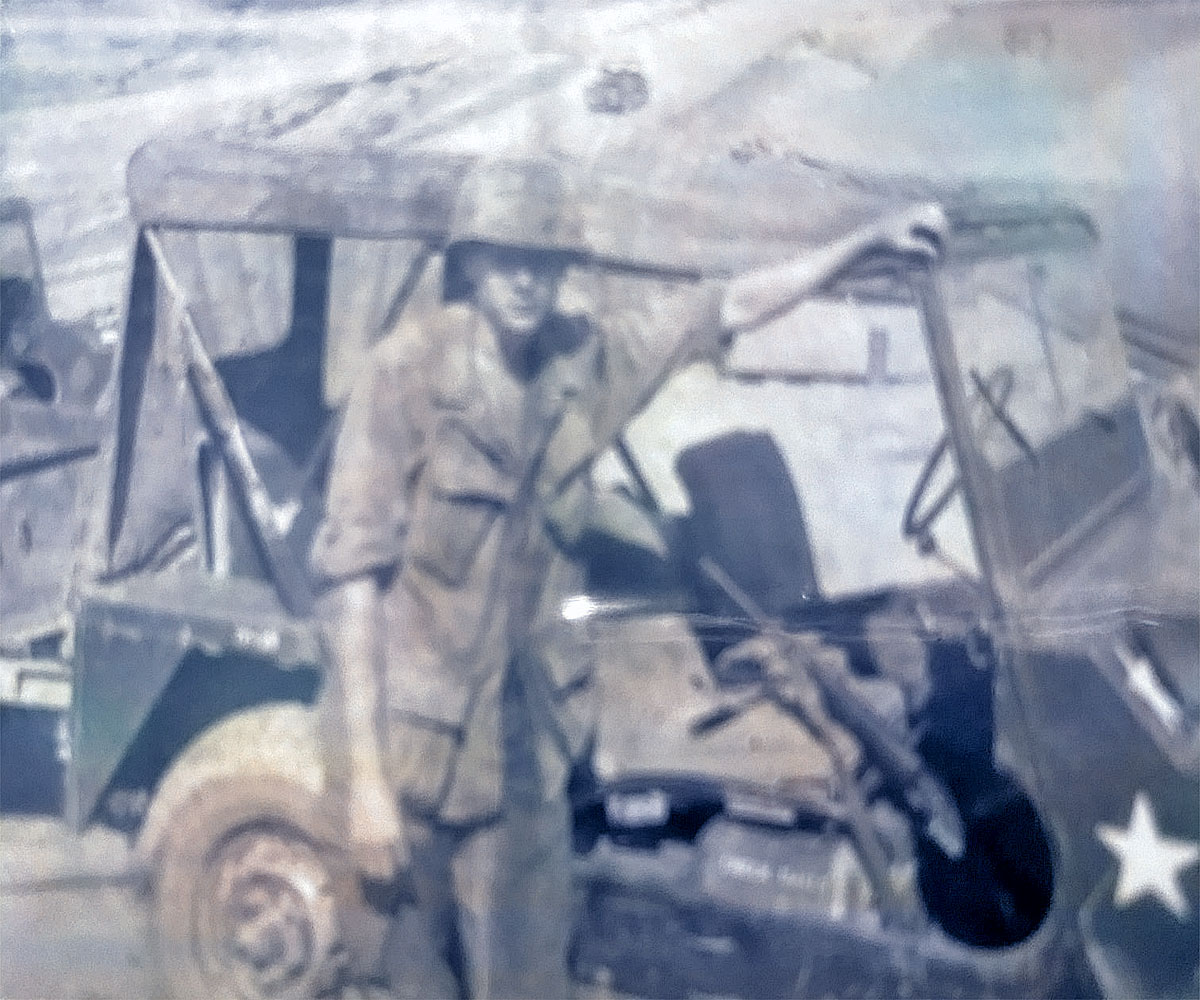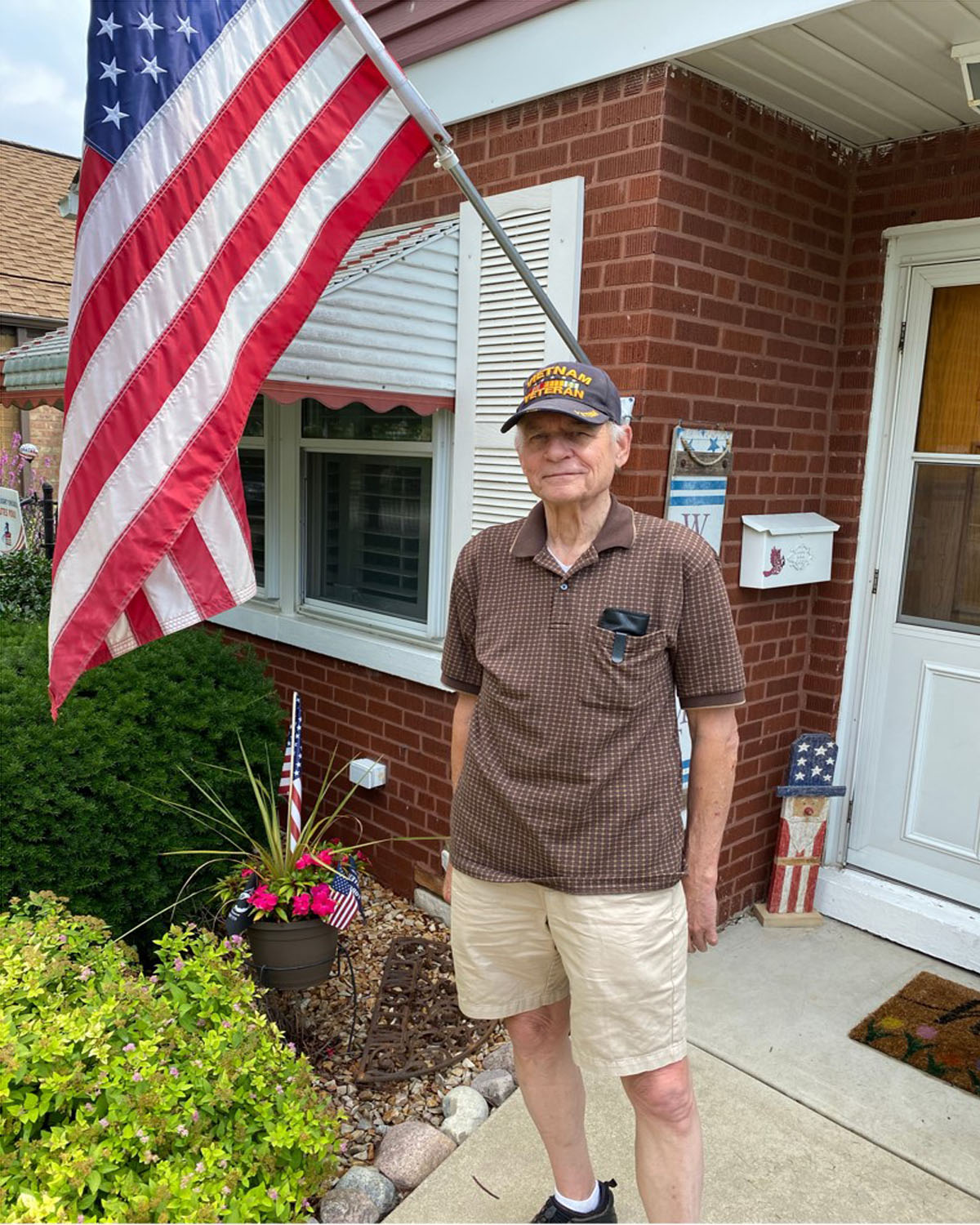U.S. Army Vietnam War Chicago, IL Flight date: 08/18/21
By Mark Splitstone, Honor Flight Chicago Veteran Interview Volunteer
Mike Morrell’s family has a long history of serving in the United States Armed Forces. His grandfather served in the Navy in World War I, half a dozen uncles served during World War II, and his father served in the US Army in the Philippines during World War II. Shortly after World War II ended, his father returned to Chicago, married Mike’s mother, and then Mike was born in 1946. He’s the oldest of six brothers; his youngest brother is twenty-one years younger than him.
After graduating from Kelly High School in 1964, Mike enrolled at the University of Illinois at Chicago, majoring in pre-med. He had received a draft deferral while in college, but after he decided to leave college, he lost the deferral. On his twenty-first birthday in November 1967, he received a letter stating, “Your friends and neighbors have selected you to represent them in the armed forces of the United States.” While enlisting in the military wasn’t something he had considered before being drafted, once he was drafted he didn’t hesitate because as he says, “you do what you can for your country.”
In December 1967, he began eight weeks of Basic Training at Fort Leonard Wood in Missouri. He recalls that when his family visited him, everybody thought that his baby brother was his son because of the twenty-one year age gap between them. After Basic Training, he was sent to Fort Polk in Louisiana for advanced infantry training, becoming proficient with M14’s, M16’s, and .45 pistols.
He completed his training at the beginning of May 1968 and then had a ten-day leave before his deployment. He took full advantage of this time by coming home to Chicago and marrying his high school sweetheart, Linda. He used to joke that she married him for the money, because she’d get the insurance money if something happened to him while he was in Vietnam. Since he’d be leaving for Vietnam from Travis Air Force Base in California, Mike and Linda flew to San Francisco for a quick honeymoon before his departure. When the honeymoon was over, they were careful to say “see you later” rather than “goodbye.”
Mike flew to Vietnam via Hawaii and Guam. He was happy that he got to fly there because he knew that many of the soldiers who came by ship had become very seasick. He landed at Bien Hoa Air Force Base near Saigon at the end of May. As soon as they opened the doors of the plane, he said it was like a blast furnace. It was 104 degrees and extremely humid. During his first night in Vietnam, the processing center where they slept was hit by a rocket attack, which he says, was a great welcome to the country.
Mike was part of the 3rd Brigade of the 82nd Airborne, also known as the “Golden Brigade.” The Golden Brigade had been heavily involved in halting the Tet Offensive earlier in the year, and Mike was one of many replacements for the casualties incurred in that battle. While the battle was over before Mike got there, he saw much of the damage and heard many stories about it while he was there. His time frame in Vietnam also represented the peak of US manpower in that country.
He was initially stationed near Saigon, but after a couple of months, he was reassigned to Hue in the northern part of South Vietnam. Some of the most intense fighting during the Tet Offensive had been in and around Hue, and Mike was able to see the resulting carnage. In fact, one of their tasks was to burn enemy corpses they found near their base. After a couple months in Hue, he returned to the Saigon area, specifically the Bien Hoa Air Base, where he spent October 1968 through May 1969. While the air base was periodically hit by rocket and mortar fire, for the most part the Americans were good at determining where the fire was coming from and could eliminate it quickly. From a weather perspective, the timing of these moves couldn’t have been worse. The monsoon season had just ended in Hue when he left and it had just begun in Saigon when he got there. It rained every day in both places, and sometimes for two or three days straight.


When he first arrived in Vietnam, Mike was chosen to be trained as the battalion morning report clerk. The morning reports showed staffing and troop movement information, wounded, new arrivals, departures, and troop strength. Companies sent the information to the battalion and then the battalion sent it to the brigade. He was part of the S1, or personnel organization. For the most part, his role required him to stay in tents in rear areas, but he sometimes spent nights in the field, usually for administrative reasons.
As he neared the end of his one year tour in Vietnam, he was given the opportunity to spend two more months in Vietnam rather than six more months at another post. He asked for a guarantee that he wouldn’t be in the field. When they couldn’t give it to him, he decided to go with the option of six more months somewhere else. As it turned out, this was a good decision, because he spent those six months stationed at Fort Ord, near Monterey Bay in California. Linda was able to live with him off-base in an apartment in Monterey. While there, he served as the company clerk for a Basic Training unit and was also a part-time drill instructor. He said that the recruits were mostly drafted but that many of them were volunteers and were still gung-ho. It was sometimes difficult to keep a positive attitude, though, because there were often anti-Vietnam protestors outside of the base.
After he was discharged in December 1969, he returned home to Chicago and went back to the University of Illinois at Chicago. He earned a degree in math, and then went to work in a data center for John Sexton, which was a part of Beatrice Foods. After five and a half years there, he went to Blue Cross Blue Shield, where he spent the rest of his career as a programmer and supervisor before moving on to management. He ended his career there in 2006 as an information security specialist.
Mike and Linda have two sons and four grandsons, all under the age of ten. He’s fortunate that three of the grandsons live just a half mile away from him and he gets to see them several times a week. He’s very active in his local VFW post, and says that it’s a busy post, with 20-30 men attending most meetings. They organize many activities, including volunteering at Veterans Hospitals and helping to teach middle school and high school kids about Americanism. He also attends 82nd Airborne reunions when they happen every couple of years.
Mike looks back on his service as a time of growing up. He went from being a “sniveling kid” to a man. It forced him to reconsider his life, and also gave him opportunities to do things he never otherwise would’ve done. His service gave him increased respect and understanding of the military, but unfortunately it also forced him to lose respect for the politicians and others who were directing the war. He mostly ignored the protestors and media coverage when he first came back, and instead was focused on his family and career. With the passage of time, though, he’s become more cynical about the world, and especially about politicians. He believes we could’ve won in Vietnam, but were held back by the politicians and the media.
Mike is proud that one of his sons recently retired after twenty-four years in the Air Force. He was the fourth generation to serve in the US Armed Forces, after Mike’s grandfather, father, and Mike.
We salute your family’s service to their country. Thank YOU for your service – enjoy your Honor Flight!


